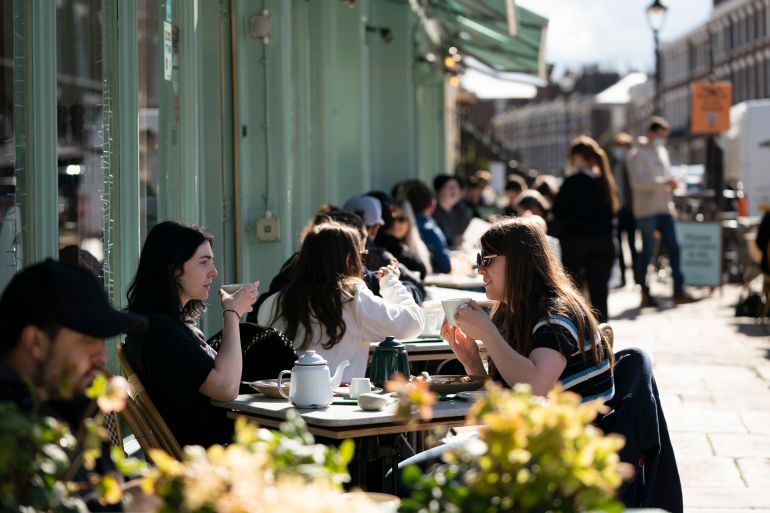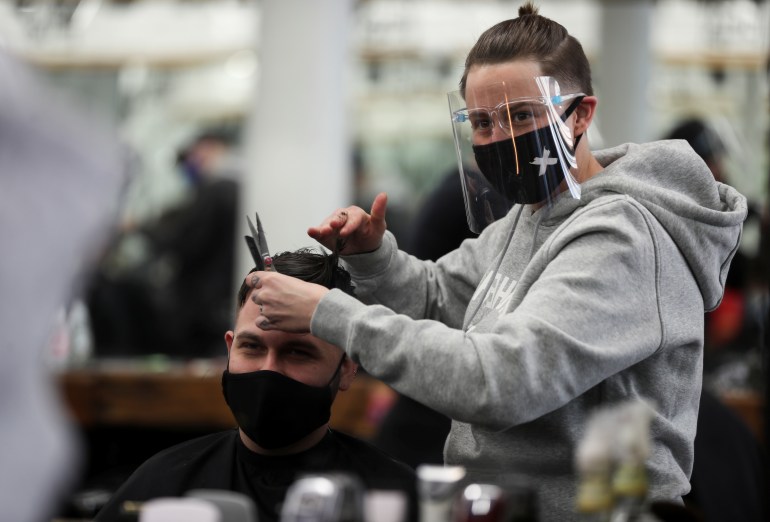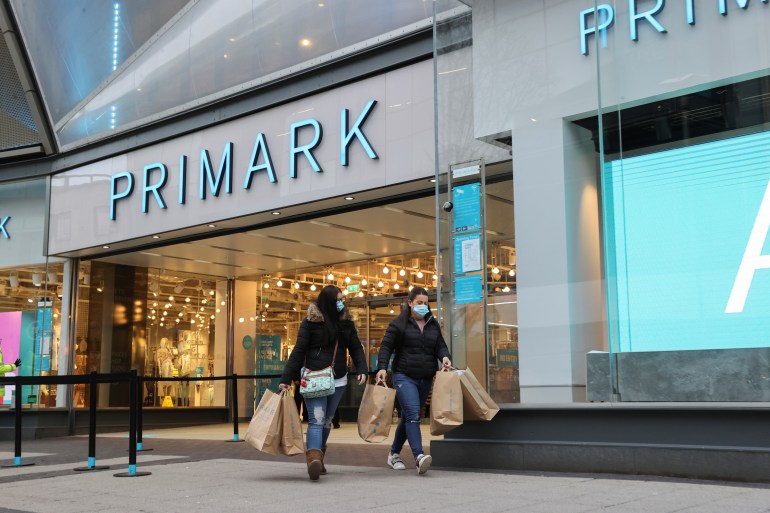England takes major step out of COVID lockdown; PM urges caution
Shops, pub gardens and salons reopen, moves underpinned by a swift vaccination effort that has seen 60 percent of adults receive a dose.

Shops, gyms, hairdressers and pub gardens reopened in England after being shuttered for months as part of a nationwide lockdown to suppress a surge in coronavirus infections.
Prime Minister Boris Johnson said the latest relaxation on Monday of the most onerous restrictions in the United Kingdom’s peacetime history was a “major step” towards freedom, as he urged people to behave responsibly with COVID-19 still a threat despite a rapid mass vaccination programme.
Keep reading
list of 4 itemsAnger boils in Northern Ireland despite attempts to end riots
Rich, old prince dies – the media, on cue, loses it
Blackmore first female jockey to win Grand National
The lockdown was enforced in England on January 6 in response to rising infection rates due to the spread of a more transmissible variant of coronavirus first identified in the southeastern county of Kent late last year.
Johnson’s Conservative Party government’s plan to ease out of the lockdown is underpinned by a vaccine rollout that has seen more than 32 million people – more than 60 percent of all adults – receive a first dose in the UK.
Nearly 7.5 million people have been fully inoculated with two doses.
Getting people spending again is crucial for the UK’s economic recovery; official data showed that 2020 was its worst fiscal year in more than three centuries, with a 9.8-percent decline in gross domestic product.
“I’m sure it will be a huge relief for those business owners who have been closed for so long, and for everyone else, it’s a chance to get back to doing some of the things we love and have missed,” Johnson said in a statement on Sunday.
“I urge everyone to continue to behave responsibly and remember ‘hands, face, space and fresh air’ to suppress COVID as we push on with our vaccination programme.”

The relaxation in measures prompted a flurry of commercial activity, with people seen queuing up outside shops across England, while others went for an early haircut.
Many enjoyed outdoor meals and drinks with friends and family, despite unseasonably cold weather that brought snow to some parts of the capital, London, and other areas.
The prime minister had promised to visit a pub himself to mark the occasion but postponed the celebratory drink after the death of Prince Philip, husband of Queen Elizabeth II, on Friday.
‘A game of two halves’
Under Johnson’s plan, indoor drinking and dining will not be allowed until at least May 17, when the next step out of lockdown is scheduled to take place.
Theatres, cinemas, nightclubs and most other venues remain closed, while indoor socialising is tightly restricted. Foreign holidays remain banned.
The government is seeking to lift all restrictions in England by mid-June and hopes that by the end of July, everyone above 18 will have received a first dose of vaccine.
Devolved administrations in the other parts of the UK – Scotland, Wales and Northern Ireland – are taking distinct but broadly similar steps.

The UK-wide vaccination campaign has cut COVID-19 deaths by more than 95 percent and cases by more than 90 percent from the January peak.
To date, the UK has recorded more than 127,000 fatalities from the pandemic, marking the fifth-highest death toll in the world.
Al Jazeera’s Rory Challands, reporting from the southeastern city of Brighton, likened the government’s approach to the crisis as a “game of two halves”.
“If you’re going to use as a footballing analogy … the first half was absolutely terrible with the government making seemingly an endless series of own goals, fatal own goals that led to the deaths of many, many thousands of people,” Challands said.
He cited a high rate of COVID-19 deaths in care homes and a failure to ensure front-line healthcare workers were supplied with adequate quantities of Personal Protective Equipment (PPE) in the early stages of the pandemic as evidence of ministerial failings.
“But what the government did early on was bet very very heavily on the vaccine programme and was one of the first countries in the world to roll it out … that has meant that the government in the second half has picked up,” Challands added. “And people are now feeling much more positive.”